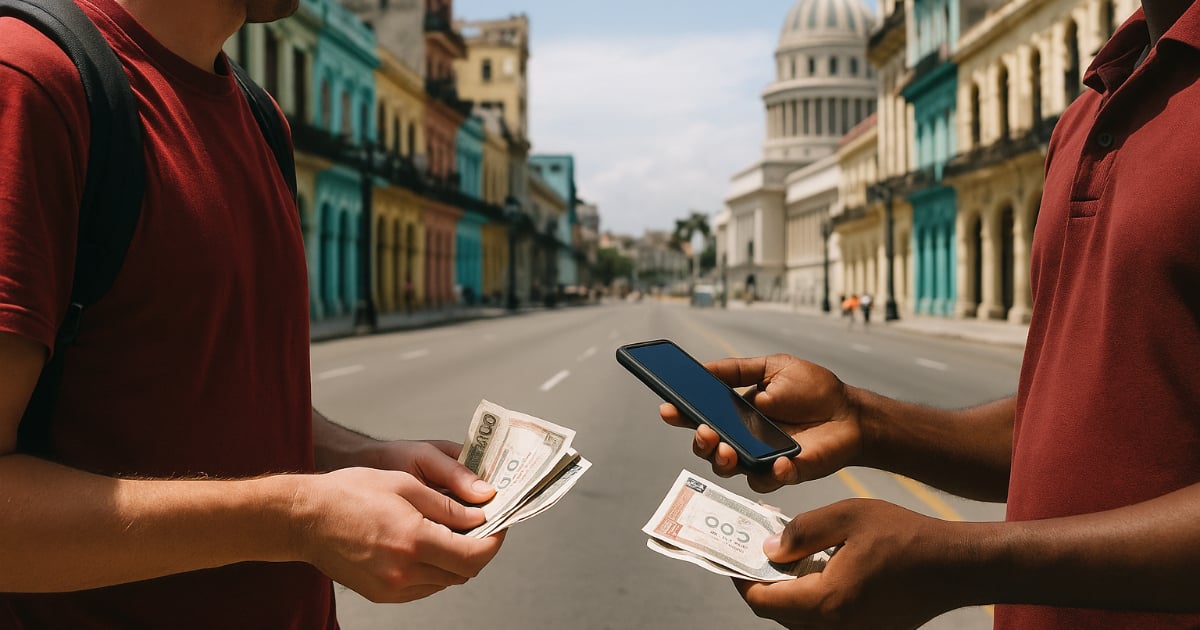Just days after ETECSA announced new tariffs and restricted the use of the Cuban peso (CUP) for mobile services, an informal market has emerged where balance is traded in foreign currency as a commodity. Screenshots of conversations are circulating on social media, showing offers of a 360 peso balance—obtainable only through international top-ups—for 1,000 Cuban pesos.
The phenomenon has sparked outrage among users who feel that the state-owned Cuban Telecommunications Company (ETECSA) has handed a golden opportunity to the informal economy while restricting legitimate access to basic services in the national currency. "International balance is already being sold on social networks. 360 pesos for a modest 1,000 CUP. And they still try to explain this to the people," Cuban lawyer Manuel Viera denounced on Facebook. "To exercise your right to information and communication through a supposedly people's company, we'll have to admit being extorted, being robbed once again."
Changes in ETECSA's Payment Options
Since May 30, ETECSA removed the option to use CUP for mobile data, texts, and calls, a move seen by large sections of the populace as a "covert dollarization" of the service. By limiting CUP top-ups to a maximum of 360 in a 30-day period, the state company forces users to purchase larger data packages in U.S. dollars (USD) or at exorbitant CUP costs. The move has drawn criticism for excluding those without access to foreign currency.
Cubans lacking access to dollars and unable to afford an additional 3GB for over 3,000 CUP are limited to acquiring a 6GB package for 360 CUP per month, which is insufficient for daily internet needs. This deepens inequality and restricts connectivity for a large part of the population. Now, to stay connected, Cubans must either receive international top-ups in USD, EUR, or MLC or purchase balance indirectly in the black market.
Public Reaction and ETECSA's Defense
"The impact has been immediate," noted a Facebook user. "Not only do they limit access, but they push people to seek illegal or disadvantageous alternatives. Who benefits from this measure?" ETECSA, for its part, has attempted to justify the price hike by claiming that the Cuban peso "has no market," according to recent statements by its president Tania Velázquez Rodríguez, who will appear again on television this Sunday to explain the controversial measure.
The executive, who appeared on the Mesa Redonda on Friday, stated, "There is a market outside Cuba that wants to communicate with their families," and that the new offers are also designed to cater to this customer segment. However, the explanations fail to convince most users, who see an essential service becoming more expensive and inequality in access to information deepening.
Meanwhile, digital balance—treated as if it were a currency—now has a street price: 360 pesos from ETECSA, exchanged for 1,000 CUP. This is another example of how the informal economy swiftly responds to the imbalances of the Cuban state model and how connectivity, instead of being a right, has become a privilege.
As Alex Umur, a user, puts it, in this scenario, Cubans add a new necessity dictated by the black market. "Juancito gets a top-up from his family abroad, Juancito sells that balance, you buy balance from Juancito, and you can keep connecting. Now we need to see how much Juancito will sell the balance for," explained the young man, reflecting the digital inequality in the country.
Understanding ETECSA’s New Tariff Measures
What changes has ETECSA made to its payment options?
ETECSA has eliminated the use of the Cuban peso (CUP) for paying mobile data, messages, and calls, restricting CUP top-ups to a maximum of 360 in a 30-day period, and encouraging the purchase of larger packages in USD or at high CUP costs.
How are Cubans responding to the new ETECSA tariffs?
Many Cubans are resorting to the informal market to buy mobile balance, trading 360 pesos for 1,000 CUP, as the new tariffs have made it difficult for those without access to foreign currency to stay connected.
Why do users criticize the new ETECSA measures?
Critics argue that the measures deepen inequality by limiting access to essential communication services to those without foreign currency, effectively making connectivity a privilege rather than a right.
